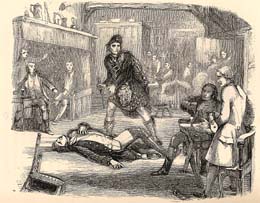|
Home | Corson
Collection | Biography | Works | Image
Collection | Recent
Publications | Portraits | Correspondence | Forthcoming
Events | Links | E-Texts | Contact
The Two Drovers
'The Two Drovers' was written between 27 June and
15 July 1827 and published as the second tale
in Chronicles
of the Canongate, First Series, on 30 October 1827. For
further information on its compositional history click here.
Sources | Synopsis | Links
Sources
'The Two Drovers' is based on an account that Scott
had heard many years previously of the trial and execution in Carlisle
of a Highland
cattle
drover
accused of the murder of an English drover. Scott's source, which
he acknowledged in the 'Magnum Opus' edition of Chronicles
of the Canongate (1831), was George Constable (1719-1803),
a friend of his father and the model
for Jonathan
Oldbuck
in The Antiquary. It has
not been established to date whether Constable's anecdote
refers to a historically
verifiable case.
Back to top
Synopsis
 Chrystal
Croftangry, narrator of Chronicles of the Canongate, presents
'The Two Drovers' as an illustration of the Highland concept of
honour.
Set in the late eighteenth century, it involves a dispute between
two cattle drovers, the Highlander Robin Oig M'Combich and his
friend
Harry
Wakefield,
a
Yorkshireman. When they put up together at an inn in Cumberland,
a misunderstanding arises over pasturage for their cattle. The
hot-tempered
Harry, egged on by local bullies, challenges Robin to a fist-fight
in the English manner to settle the question. Robin refuses, insisting
he will either fight like a Highland gentleman with a broadsword
or appeal to the law. Harry knocks him to the floor and promptly
forgets the quarrel. Robin, leaves the inn, walks twelve miles
to
fetch his dirk (Highland dagger), and returns to kill Harry with
one blow. He then gives himself up to justice and goes to his execution,
happy
to
give his life for the life he took. Chrystal Croftangry claims
to have been present at his trial as a young lawyer. Chrystal
Croftangry, narrator of Chronicles of the Canongate, presents
'The Two Drovers' as an illustration of the Highland concept of
honour.
Set in the late eighteenth century, it involves a dispute between
two cattle drovers, the Highlander Robin Oig M'Combich and his
friend
Harry
Wakefield,
a
Yorkshireman. When they put up together at an inn in Cumberland,
a misunderstanding arises over pasturage for their cattle. The
hot-tempered
Harry, egged on by local bullies, challenges Robin to a fist-fight
in the English manner to settle the question. Robin refuses, insisting
he will either fight like a Highland gentleman with a broadsword
or appeal to the law. Harry knocks him to the floor and promptly
forgets the quarrel. Robin, leaves the inn, walks twelve miles
to
fetch his dirk (Highland dagger), and returns to kill Harry with
one blow. He then gives himself up to justice and goes to his execution,
happy
to
give his life for the life he took. Chrystal Croftangry claims
to have been present at his trial as a young lawyer.
Back to top
Links
Back to top
Back to Index of Works
Last updated: 19-Dec-2011
© Edinburgh University Library
|

 Chrystal
Croftangry, narrator of Chronicles of the Canongate, presents
'The Two Drovers' as an illustration of the Highland concept of
honour.
Set in the late eighteenth century, it involves a dispute between
two cattle drovers, the Highlander Robin Oig M'Combich and his
friend
Harry
Wakefield,
a
Yorkshireman. When they put up together at an inn in Cumberland,
a misunderstanding arises over pasturage for their cattle. The
hot-tempered
Harry, egged on by local bullies, challenges Robin to a fist-fight
in the English manner to settle the question. Robin refuses, insisting
he will either fight like a Highland gentleman with a broadsword
or appeal to the law. Harry knocks him to the floor and promptly
forgets the quarrel. Robin, leaves the inn, walks twelve miles
to
fetch his dirk (Highland dagger), and returns to kill Harry with
one blow. He then gives himself up to justice and goes to his execution,
happy
to
give his life for the life he took. Chrystal Croftangry claims
to have been present at his trial as a young lawyer.
Chrystal
Croftangry, narrator of Chronicles of the Canongate, presents
'The Two Drovers' as an illustration of the Highland concept of
honour.
Set in the late eighteenth century, it involves a dispute between
two cattle drovers, the Highlander Robin Oig M'Combich and his
friend
Harry
Wakefield,
a
Yorkshireman. When they put up together at an inn in Cumberland,
a misunderstanding arises over pasturage for their cattle. The
hot-tempered
Harry, egged on by local bullies, challenges Robin to a fist-fight
in the English manner to settle the question. Robin refuses, insisting
he will either fight like a Highland gentleman with a broadsword
or appeal to the law. Harry knocks him to the floor and promptly
forgets the quarrel. Robin, leaves the inn, walks twelve miles
to
fetch his dirk (Highland dagger), and returns to kill Harry with
one blow. He then gives himself up to justice and goes to his execution,
happy
to
give his life for the life he took. Chrystal Croftangry claims
to have been present at his trial as a young lawyer.